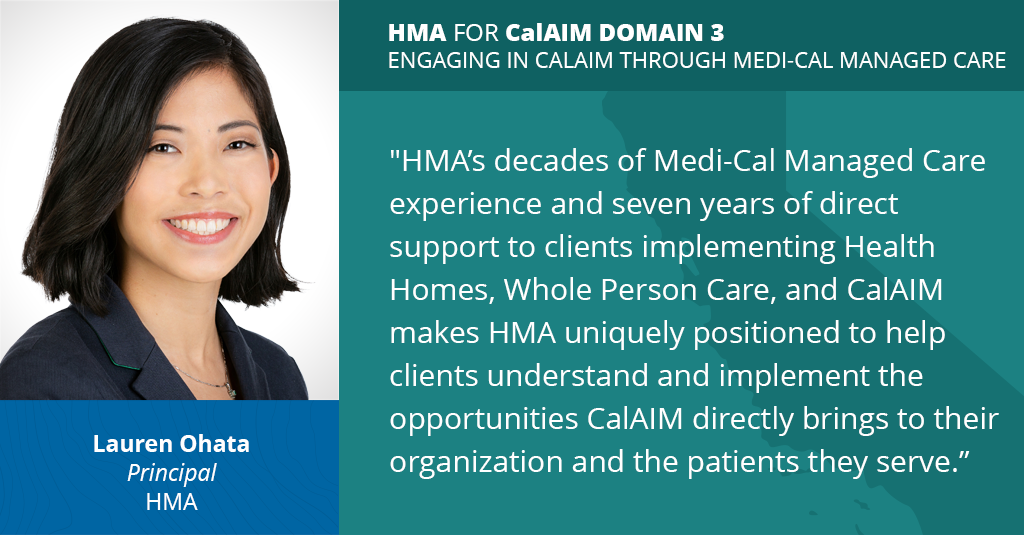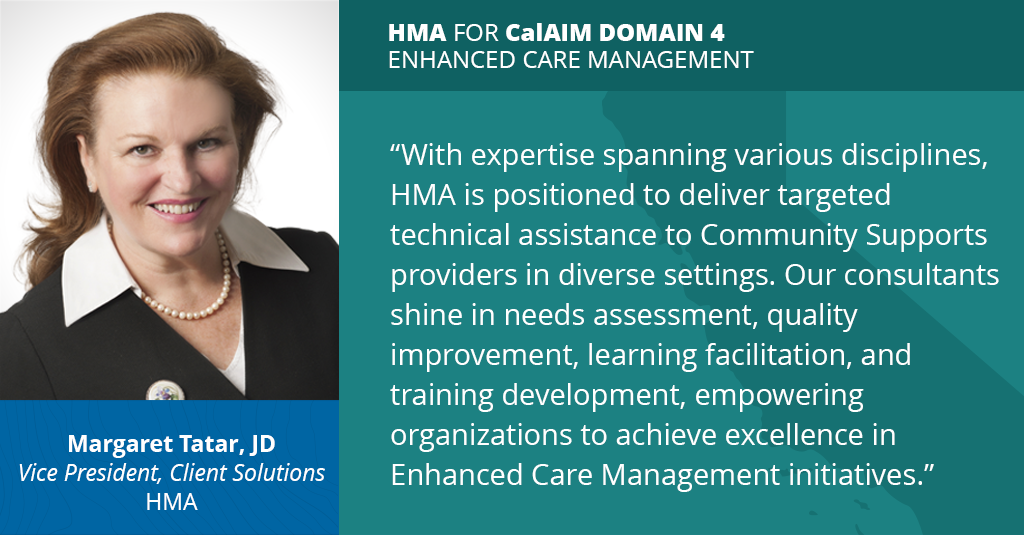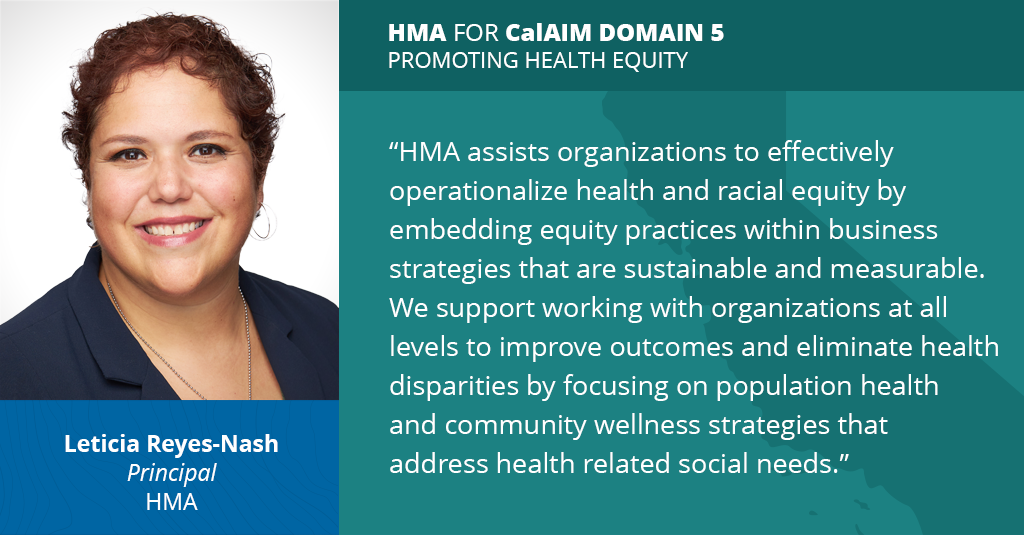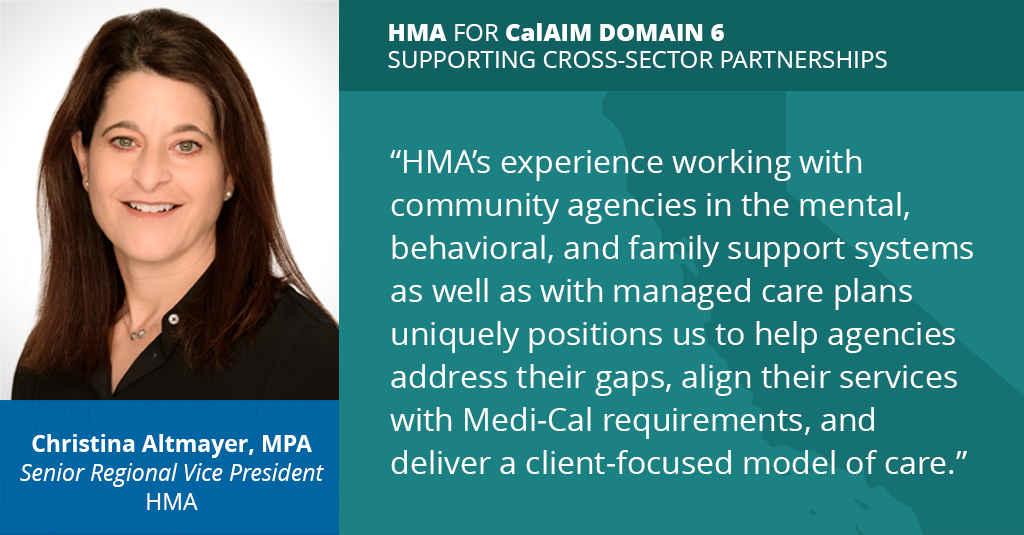Improving the quality of life for millions of Californians.
California Advancing and Innovating Medi-Cal (CalAIM) is a sweeping multi-year initiative aimed at innovating and transforming Medi-Cal to improve the quality of life of 14 million plus Medi-Cal enrollees, offering more equitable, coordinated, and person-centered care. Developed and funded by the California Department of Health Care Services (DHCS), CalAIM will introduce new programs, build on prior initiatives, such as Whole Person Care, the Health Homes Program, and the Coordinated Care Initiative, and integrate California’s delivery systems to better facilitate the overall Medi-Cal program.
The success of the CalAIM initiative is predicated on the strong support and participation of multiple partners including community-based organizations (CBOs), public hospitals, county agencies, federally qualified health centers, and others – together with firms like Health Management Associates (HMA), who can provide the resources, services, and expertise to help these organizations implement CalAIM programs over the next several years.
Jump ahead to:
- Domain 1. Building Data Capacity: Data Collection, Management, Sharing and Use

- Domain 2. Community Supports: Strengthening Services that Address the Social Drivers of Health

- Domain 3. Engaging in CalAIM through Medi-Cal Managed Care

- Domain 4. Enhanced Care Management (ECM): Strengthening Care for ECM “Populations of Focus”

- Domain 5. Promoting Health Equity

- Domain 6. Supporting Cross-Sector Partnerships

- Domain 7. Workforce

- Cross-Cutting Competency of Rural Communities

Expert Resources
Organizations looking for support to help them establish the infrastructure to support CalAIM’s Enhanced Care Management and Community Supports can access the virtual Providing Access and Transforming Health (PATH) Technical Assistance (TA) Marketplace. There they’ll find state-approved technical vendors who can provide services fully funded by the state. HMA is honored to be a selected vendor for the marketplace. Given our deep expertise in CalAIM policy, operations and implementation and long-standing relationships with payers, CBOs, state agencies, and others, HMA is one of only two firms (out of dozens of vendors) that is approved to provide services and resources across all seven CalAIM medical and social service domains of care.
HMA also actively supports clients across California implementing the CalAIM Section 1115 Waiver Demonstration Justice-Involved Initiative.
Domain 1. Building Data Capacity: Data Collection, Management, Sharing and Use
HMA has provided building data capacity technical assistance (TA) regarding the implementation of CalAIM population health management (PHM), enhanced care management (ECM), and community supports (CS) initiatives to multiple Medi-Cal managed care plans (MCPs) and county agencies, as well as numerous other Medicaid MCPs and county and state Medicaid agencies across the country. HMA is well positioned to provide building data capacity TA to Medi-Cal MCPs, community-based organizations, clinics, and county agencies engaged in the implementation of CalAIM initiatives, particularly the PHM, ECM, CS, and justice-involved initiatives.
Data Capacity Project Examples
HMA developed a Data Capacity and “Data Readiness” Framework for participants of the High-Intensity Learning Collaborative, inclusive of criteria to assess critical dimensions of data capacity.
Leveraging this framework, we assisted five states in assessing their readiness across dimensions, including people, processes, data availability, data quality and value, data management, data exchange, and reporting.
HMA provided information management and data capacity TA to multiple providers operating as Medicaid Health Homes in a Medicaid managed care program to integrate primary care, behavioral health, and substance use disorder care.
This included optimizing electronic health records, the program’s health information exchange and other tools to support measurement-based care.
HMA provided a series of CalAIM webinars and workshops to members of a government health plan consortium.
This included a workshop focused on required data exchange between Medi-Cal MCPs and contracted ECM/CS providers and overcoming related challenges.
Meet your Domain 1 Experts






Domain 2. Community Supports: Strengthening Services that Address the Social Drivers of Health
Hundreds of HMA consultants can be drawn on for the provision of TA to CS providers in both rural and urban settings, including dozens of recognized and highly respected experts who are organized into functional divisions, including CS, service delivery, behavioral health, addictions, justice-involved, and quality. We are highly skilled in needs assessment; quality assessment and improvement; the development and facilitation of learning sessions and learning communities, the development and delivery of training curricula, webinars, and other teaching-related activities; and practice coaching.
Community Supports Project Examples
HMA is currently engaged with a Medi-Cal managed care plan to design and deliver a curriculum for CalAIM ECM and CS training across multiple counties in the plan’s service areas.
HMA is delivering the curriculum to health plan providers (social workers, registered nurses, community health workers, behavioral health aides, care coordinators, supervisors, and managers, among others) in a tri-county service area. The work includes software platform training, quarterly, 90-minute learning sessions to facilitate collaboration across the system and to deepen learnings, build capacity, and share resources and practice coaching with guidance, tools, and other resources to aid the provider team in achieving its improvement goals.
HMA has supported one of the nation’s largest publicly operated health plans on Health Homes Programs (HHP) and Whole-Person Care (WPC) program transitions to ECM and CS as well as ECM and CS implementation, Individual Program Plan strategy, and funding process.
HMA’s support has included assisting with network development and engagement strategy; helping with HHP, ECM, and CS capacity building; developing a TA curriculum; designing and managing the Incentive Payment Program process; developing regulatory documentation to meet regulatory filings; developing work plans, models of care, provider tools, managed care plan tools, workflows, and policies and procedures for both ECM and CS; and providing strategic planning, analysis, and project management to identify and respond to emerging needs.
A central valley county has retained HMA to prepare them to be an ECM and CS provider for the two health plans serving that county.
HMA has provided initial and ongoing TA and education to county staff across five agencies on the CalAIM program, specifically on ECM and CS requirements and contracting opportunities, and helped the county develop a strategy to work with the health plans and Department of Health Care Services in pursuit of Incentive Payment Program, PATH (Providing Access and Transforming Health Program), and Capacity and Infrastructure Transition Expansion and Development Initiative funding applications.
Meet your Domain 2 Experts








Domain 3. Engaging in CalAIM through Medi-Cal Managed Care
The HMA team is skilled at all policy and operational areas of Medi-Cal managed care having led managed care organizations, delivery systems, and state Medicaid and public health programs.
Medi-Cal Managed Care Project Examples
Our multiyear work for one Medi-Cal managed care plan supported more than 50 Health Homes teams.
We planned and developed content/materials and conducted webinars, learning sessions, virtual practicums, discipline-specific support, and practice coaching. We also supported another Medi-Cal managed care plan in designing and delivering an ECM training program for their ECM provider teams.
HMA recently reviewed many ECM and CS applications for a California health plan and worked with several other plans in Southern California to collectively assess the readiness of providers for CalAIM.
This included reviewing the individual applications and developing gap closure plans, working with the providers one-on-one to assist them in transitioning their efforts to meet the CalAIM ECM community supports.
HMA is assisting a Medi-Cal managed care plan in their implementation of CalAIM ECM and CS services through providers across their multi-county service area.
This assistance included working with teams that were new to ECM and CS in developing and engaging, along with the health plan providers who were new to CalAIM. This engagement was facilitated via a multi-modal approach, including: 1) development of a webinar series with topics including getting started in ECM and CS; 2) facilitation of an ongoing learning collaborative for the purpose building a collaborative community and sharing learnings across providers; and 3) provision of ongoing individual team practice coaching addressing team-based care, team workflows, the onboarding of new team members, case consultations, working with unhoused persons, and collaboration with primary care and other community providers.
Testimonial
“Our company was somewhat late in learning about the CALAIM initiative, and in May of 2023 we went to Health Management Associates (HMA) to help us understand the program’s goals, and how we might participate in it. Soteria is a 13-year-old home health agency and HMA helped us understand our natural fit with CALAIM and their Populations of Focus. We have successfully begun to enter into agreements with local MCPs, and HMA has been outstanding in assisting us throughout the complex certification processes. They have been helpful in our understanding of our five MCPs’ desires in our country. This has allowed us to focus on what the MCPs want to see in the Certifications we submit.
HMA also helped us understand the non-binding payor rates and fee per service derivations published by DHCS, which were very different from our prior Medicare and Medi-Cal claims experience.
I would recommend HMA as a logical choice for any company looking for assistance from the TA Marketplace, and we intend to continue working with them as CALAIM’s programs mature.”
Cal Carrera, Chief Operations Officer
Soteria Home Health Agency, Inc.

Meet your Domain 3 Experts








Domain 4. Enhanced Care Management (ECM): Strengthening Care for ECM “Populations of Focus”
Hundreds of HMA consultants can be leveraged for the provision of technical assistance (TA) to Community Supports (CS) providers in both rural and urban settings, including dozens of recognized and highly respected experts who are organized into functional divisions, including CS, service delivery, behavioral health, addictions, justice-involved, and quality.
HMA’s consultants are highly skilled in the TA areas of needs assessment, quality assessment and improvement, the development and facilitation of learning sessions and learning communities, and the development and delivery of training curricula, webinars, and other teaching-related activities. HMA also features an extensive pool of consultants who are highly skilled in the areas of practice coaching.
ECM Project Examples
HMA is assisting one Medi-Cal managed care plan in their implementation of CalAIM CS services across their service area.
This includes development of an online seminar series with topics including assessment, care planning, outreach and engagement, complex clients, safety and de-escalation, housing readiness, and medical needs of the unhoused. It also includes CS practice coaching via individual team meetings.
HMA provided comprehensive implementation support for a large Medi-Cal managed care plan’s Health Homes Programs (HHP) and subsequent Enhanced Care Management (ECM) teams in their rollout of more than ten internal and forty network provider care teams.
HMA assisted IEHP in reviewing Department of Health Care Services readiness materials, developing clinical and financial models, and completing ECM readiness materials for the state. The implementation supports HMA provided included multiple subdivisions, including needs assessment and planning, leadership consultation, health information technology support, and training.
HMA has supported the nation’s largest publicly operated health plan on HHP and Whole-Person Care program (WPC) transitions to ECM and Community Supports (CS) as well as ECM and CS implementation, Individual Program Plan strategy, and funding process.
HMA’s support has included facilitating work group meetings with various county agencies to support WPC transition and CalAIM implementation and developing financial workflows and reporting for federal matching, including policy and procedure enhancements.

Meet your Domain 4 Experts








Domain 5. Promoting Health Equity
HMA is committed to addressing structural inequities as a critical pillar of organizational transformation, and as a result, we center equity, diversity, and inclusion in every aspect of our work, from project design to completion. HMA centers social and health equity as a foundational pillar in implementing the new Enhanced Care Management benefit and Community Supports. HMA has adopted the definition articulated by Race Forward, “Equity ensures that outcomes in the conditions of well-being are improved for marginalized groups, lifting outcomes for all. Equity is a measure of justice.”
Promoting Health Equity Project Examples
HMA is at the forefront of efforts to address health disparities and inequities and has already hosted multiple national webinars in this area.
Our last in a four-part series on how to address local opioid crises was in November 2022, and involved not only HMA colleagues, but also community-based practitioners who are leveraging evidence-based practices centered on equity to provide support to our most marginalized individuals through harm reduction, overdose prevention, and linkage to community treatment services.
Under the California Reducing Disparities Project, HMA created partnerships with LGBTQ community-focused social service and mental health agencies to pursue an innovative grant opportunity to reduce mental health disparities in minority communities.
We advised our community-based organization partners on the competitive statewide California Department of Public Health grant program, which was designed to fund community-defined evidence-based practices and pair them with rigorous evaluation to create an evidence base for their effectiveness. Together with the partner agencies, HMA developed each partner’s proposal strategy, wrote the required evaluation plans, and secured $1.2 million in funding. Following the awards, we are serving as the evaluator for four out of the seven agencies serving the LGBTQ population in programs statewide.
Within the first few months of the pandemic, HMA conducted the “Addressing Community Health Workers/Promotore(s) (CHW/P) Workforce Challenges and Opportunities from COVID” project for a California foundation.
Through a series of community meetings, the project surfaced workforce development strategies that could better support the CHW/P workforce as California was increasingly impacted by COVID-19.

Meet your Domain 5 Experts








Domain 6. Supporting Cross-Sector Partnerships
HMA has comprehensive expertise across all domains of managed care policy and operations, and we support foundations, associations, governments, hospital systems, managed care organizations, and other providers both in California and nationally. Our team is experienced in standing up new programs in the government healthcare space and in how to implement these programs through partnerships among managed care plans, community providers, government agencies at all levels, and underrepresented populations. HMA thoroughly understands the need for aligned interests and the infrastructure required to start up new Medi-Cal benefits and services.
Cross-Sector Partnership Examples
A central valley county retained HMA to prepare them to be an ECM and CS provider for both of the managed care plans serving their county.
HMA has provided initial and ongoing technical assistance and education to county staff across five agencies on the CalAIM program, specifically on ECM and CS requirements and contracting opportunities, and helped the county develop a strategy to work with the health plans and DHCS in pursuit of Incentive Payment Program, PATH (Providing Access and Transforming Health) Program, and Capacity and Infrastructure Transition Expansion and Development Initiative funding applications.
HMA was brought in to help in the design and implementation of the lone California city to launch a Whole Person Care (WPC) pilot program.
In this role, HMA developed the provider contracting templates, onboarding processes, provider training programs, and project management approach and helped facilitate community engagement efforts among the city, lead entities, community stakeholders, federally qualified health centers, community-based organizations, health plans, and hospital systems.
HMA supported a large Medi-Cal managed care plan in their transition from Health Homes and WPC pilots into ECM and CS, including work with two (2) county Behavioral Health departments, numerous community health providers, and one full-service partnership provider.
In all of these areas, HMA supported the plan in developing new data-sharing and patient care-coordination protocols, new policies, workflows, and training materials for this population of focus.

Meet your Domain 6 Experts
Domain 7. Workforce
HMA has comprehensive expertise in the CalAIM initiatives and the opportunities that are emerging from CalAIM to increase resources to support, attract, and retain an expanded medical and behavioral health workforce. We are highly skilled in the development and delivery of training curricula, webinars, and other teaching-related activities, and practice coaching. In addition to workforce training and development programs, HMA also provides interim executive management and clinician services to managed care plans and other provider organizations, as well as transition and succession planning assistance.
We also have comprehensive expertise in the Mental Health Services Act (MHSA) support and planning process that counties use to support the behavioral health workforce. Our experience has been with counties in California investing in an expanded behavioral health workforce, adopting and promoting policy changes that are effective in both attracting and retaining varying levels of professional and licensed workers, and partnering with economists to project emerging needs and opportunities.
As noted elsewhere, HMA has also developed and implemented CalAIM-specific clinician and provider training and education programs to prepare key participants and stakeholders for the opportunities that CalAIM presents in reforming the delivery system. These programs have served:
- Managed care plans and associations
- County governments
- Community-based organizations
- Community health systems and providers, including safety-net providers
- Community stakeholders
Workforce Project Examples
Our largest recent body of work in developing workforce training and organizational improvement programs resides in the work HMA has done for the State of California and county correctional agencies, through the Expanding Access to Medication-Assisted Treatment (MAT) in County Criminal Justice Settings program, or “Jail MAT.”
HMA project coaches facilitate in-person learning collaboratives, conduct monthly coaching calls with county teams to help teams customize approaches to their unique jails and healthcare systems, and provide topic-specific webinars, discussion groups, office hours, and ongoing technical assistance. In addition to these workforce training and development programs, HMA also provides interim executive management and clinician services to managed care plans and other provider organizations, as well as transition and succession planning assistance.
HMA is currently engaged with a Medi-Cal managed care plan to design and deliver a curriculum for CalAIM Enhanced Care Management (ECM) and Community Supports (CS) training across multiple counties in the plan’s service areas.
HMA is delivering the curriculum to health plan providers (social workers, registered nurses, community health workers, behavioral health aides, care coordinators, supervisors, and managers, among others) in a tri-county service area. The work includes software platform training, quarterly, 90-minute learning sessions to facilitate collaboration across the system and to deepen learnings, build capacity, and share resources and practice coaching with guidance, tools, and other resources to aid the provider team in achieving its ECM and CS goals.
Within the first few months of the pandemic, HMA conducted the “Addressing Community Health Workers/Promotore(s) (CHW/P) Workforce Challenges and Opportunities from COVID” project for a California foundation.
Through a series of community meetings, the project surfaced workforce development strategies that could better support the CHW/P workforce as California was increasingly impacted by COVID-19.
HMA supported a Southern California county’s behavioral health task force to educate and familiarize all members with the Medi-Cal and CalAIM opportunities related to expanded coverage, scope, and the funding streams available to attract and retain a full continuum of the professional and certified behavioral health workforce.
The work continues to build on policy recommendations and initiatives.
HMA is supporting a rural California county’s Behavioral Health Department in developing and implementing a mobile crisis response, which includes investing in and supporting a full continuum of crisis care and the behavioral health workforce necessary for that continuum.
Our work covers policy guidance, strategic planning, budgeting, workforce evaluation, and continuing to develop and take advantage of emerging resources.
Meet your Domain 7 Experts







Cross-Cutting Competency of Rural Communities
HMA also has expertise in and hands-on experience with addressing the unique challenges experienced by providers and partner agencies serving rural communities. We have worked in a number of states and have assisted with rural-specific workforce solutions, programs addressing health related social needs, behavioral health services and supports, and other areas.
In 2022, HMA convened stakeholder roundtables in three states – including New Mexico, North Dakota, and Tennessee to identify the challenges facing dually eligible individuals living in rural areas and to propose solutions to these challenges. Informed by this process, HMA developed the Health Equity & Access for Rural Dually Eligible Individuals (HEARD) Toolkit.
Rural Project Examples
HMA is supporting a rural California county’s Behavioral Health Department in developing and implementing a mobile crisis response, which includes investing in and supporting a full continuum of crisis care and the behavioral health workforce necessary for that continuum.
Our work covers policy guidance, strategic planning, budgeting, workforce evaluation, and continuing to develop and take advantage of emerging resources.
HMA is working with the Colorado Department of Health Care Policy and Financing (HCPF) to perform a dynamic heat mapping as the first phase of a three-phase project that includes an environmental scan of home and community-based services (HCBS)/Medicaid. HMA is creating a tool that HCPF can leverage to update and track progress to close provider gaps. In subsequent work HMA will identify potential geographic regions which would benefit from reimbursement structure changes, including geographic adjustment factors to apply to preexisting fee-for-service rates or other mechanisms to effectively address identified care gaps.
HMA is delivering the curriculum to health plan providers (social workers, registered nurses, community health workers, behavioral health aides, care coordinators, supervisors, and managers, among others) in a tri-county service area. The work includes software platform training, quarterly, 90-minute learning sessions to facilitate collaboration across the system and to deepen learnings, build capacity, and share resources and practice coaching with guidance, tools, and other resources to aid the provider team in achieving its ECM and CS goals.
See HMA’s other rural health projects listed online.
Meet your Rural Health Experts







